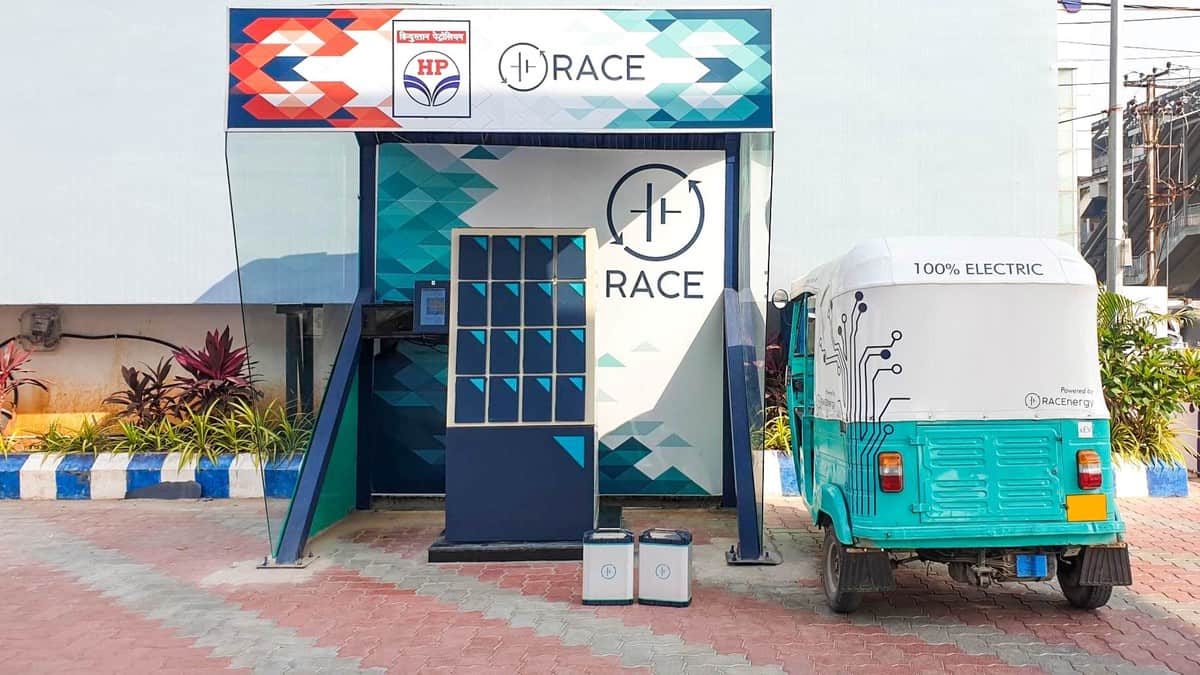
Hyderabad: The ubiquitous yellow autos in cities are a dime a dozen. Just like any other service, using a three-wheeler for commuting today has become costlier, thanks to rising prices of petrol, diesel, and gas. With cities becoming economic engines of states, more fuel usage also translates to more environmental harm, and also of course more haggling with auto drivers.
Enter RACEnergy, an electric vehicle infrastructure company that has come up with a battery swapping technology for electric 2 and 3-wheelers. Founded by BITS Pilani alumni, Arun Sreyas and Gautham Maheswaran in 2018, it is planning to set up 500 battery swap stations in India by mid-2023, of which 100 will be in Hyderabad, with the intention to make commuting more environment friendly.
The battery swapping tech for autos was launched in January after three years of research and development. In a phone interaction with Siasat.com Arun said that RACEnergy currently has 100 retrofitted (or battery converted) autos. It currently has 10 battery swapping stations in Hyderabad, most of which are on the western side, towards Hitec City, Kondapur, etc.
“Unlike a regular electric vehicle, wherein charging and maintenance is on the drivers, RACEnergy will take care of that part,” stated Arun. Auto drivers, just like going to a fuel station, can go to a swapping station and get their batteries swapped. A fully charged 6.5-kilowatt setup will last for about 100 kilometers, added Arun.
“In this case, the auto drivers don’t have to do anything. The cost for a full charge is Rs 200, and each driver is not going to come with a battery nearing depletion. So if someone comes with 40% battery life, they pay for the 60%. Battery life depends on how you maintain and charge it,” explained Arun, when asked about the practicality and the economics of this new tech.
The swapping can also be done in just a few minutes, says the company.
According to RacEnergy’s estimations, using one of their battery-fitted autos will prove to be a lot cheaper for auto drivers, instead of the traditional LPG/diesel vehicles. For any auto driver interested, the company will do the conversion at a cost of Rs 65000, of which Rs 10,000 will be the down payment (the rest can be paid in installments).
More savings for auto drivers?
The retrofit autos are expected to bring down daily operational costs per kilometer from Rs 4 to Rs 1.5/2, translating to savings of Rs 5000 per month. “Auto drivers are aware of their expenses, as many of them have been in this sector for over a decade. We have not done any marketing, and information about our product has spread through word of mouth,” added Arun.
According to a release from RACEnergy, autos retrofitted have been certified safe for their internally and externally cooled batteries, which also come with a lifetime service warranty.
Are battery-powered vehicles safe? What about rains?
Over the last month or so, e-vehicles or battery-powered vehicles have hit headlines as two-wheeler batteries in Hyderabad have exploded. Moreover, Shaikh Salauddin, who heads the Telangana Gig and Platform Workers union, said that there is also a risk of these new battery-run autos getting damaged in rains.
”We have thoroughly tested the batteries for three years. Those are also IP 66 rated, and sealed. Moreover, our retrofitted autos can pull more load than the regular ones. That is the first thing drivers test, especially given that they have to go through hilly areas like Jubilee hills, etc,” explained Arun.
He added that RACEnergy is expected to bring in at least a few thousand autos under its fold. Most of their retrofitted units and swapping stations will also be concentrated in Southern India as well.



